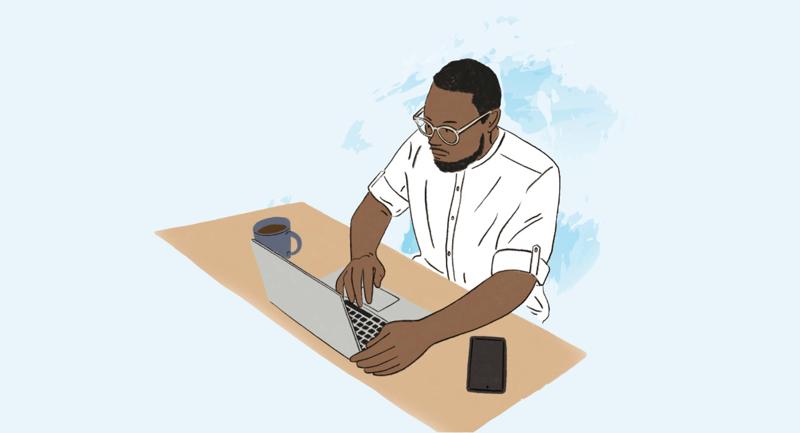My body half-folded over, I sat on the edge of the exam table, weeping. I had been walking around for weeks feeling hollow and numb inside, yet my doctor's words hit me like a truck. "You've tested positive on this depression and anxiety screener," he said. "You need to contact a therapist."
With hot tears rolling down my face, I tuned out the rest of the doctor's words. I thought, Me? How could I be depressed? Instantly, I was filled with shame, because as a devout Christian and a Black woman, I felt like I wasn't supposed to let this happen. How did I get here? I wondered. How will I explain this to my mother?
As the doctor and I talked about my life, it became evident that I was simply overwhelmed. I was in my eleventh year of teaching middle school, piloting a new curriculum, managing a long-distance relationship, planning my upcoming wedding, and completing my doctoral studies. In hindsight, my plate was overflowing, but at the time it just seemed normal.
Although wedding planning and pursuing a doctorate were indeed stressful, the main source of my stress was my job. I loved teaching, but dealing with the politics and microaggressions of a majority-white school system as a Black female employee had become too much.
For years, I had bottled up my anger and frustrations with the district and administration, masking them with silence and a smile to not make waves. Pretending to be strong and positive in the midst of a toxic environment was not only taking a toll on my mental health, but (as I would later find out) on my physical health.
The Embodiment of Stress
What I was experiencing was the embodiment of stress. Many Black women are socialized to appear strong, but their bodies, as Beauboeuf-Lafontant (2009) explains, "become repositories for the thoughts, feelings, and realities that contradict the one-dimensional view of them as unflaggingly capable and ever-resilient." Black women who embody stress will exhibit emotional strength and care for others while neglecting their own needs, all while being marginalized in society by race, class, and gender. This exhaustive outward display becomes a burden. Their bodies internally store stress, which manifests through masked anxiety, depression, or physical ailments.
Before visiting the doctor, I had frequent headaches, abdominal pain, and difficulty sleeping. I also had recurring digestive episodes. They would start with a hint of nausea, followed by persistent chills, spasms, diarrhea, and vomiting all night. As a result, I would be so physically depleted that I couldn't teach for a couple of days. The first couple times it happened, I thought I caught a stomach flu from my students.
After my doctor recommended therapy, I learned that these digestive episodes were panic attacks brought on by anxiety. My therapist and I discovered a pattern: The panic attacks happened when I had a deadline for grad school, when report cards were due, or when I was returning to work after a break. This was true even though I'd been teaching for over a decade, considered myself a master teacher, and had the respect of my school community.
During my tenure, I spent many years teaching more preps than others, moved classrooms frequently, and was repeatedly assigned more challenging students than some of my white colleagues because I was seen as "a good fit." Not wanting to be seen as weak, I dealt with these challenges without complaining, hoping they would make me stronger. Yet, as much as I tried to be strong, eventually it became too much.
The "StrongBlackWoman" Cycle
Psychologist Chanequa Walker-Barnes (2014) introduced the term StrongBlackWoman (SBW), purposely written with no spaces to differentiate a Black woman who embodies stress from a "strong Black woman" (with spaces)—a Black woman who happens to be strong and experience stress, but is taking care of herself, seeking and receiving support. Building upon the embodiment of stress concept, Walker-Barnes explained that an SBW may get caught in a cycle. After embodying stress for some time, this woman will experience an emotional or physical breakdown. However, instead of seeking treatment, she'll often internalize what is occurring with her health to keep portraying strength—and the cycle continues.
My breakdown happened during my doctor's visit. As my physician inquired about my job, I found myself shaking my head and screaming, "HE HAS FAVORITES!" The rage I felt pulsated through my whole body as I beat my balled-up fists on my thighs. For many years, I'd felt that my administrator showed preferential treatment toward certain white teachers regarding decision-making discussions, leadership, and classroom arrangements. I and other teachers of color were often dismissed or overlooked, and I had internalized feelings of resentment.
Validating Lived Experience
My doctoral research (Hughes, 2019) focused on Black women in education and how Black female teachers navigate majority-white, suburban school districts. I conducted interviews and a focus group in which Black female teachers shared their experiences in such districts. Stress, perceptions of strength, and self-care were common topics, and in the midst of this research, I began to resonate with these findings in my personal life.
Two of the teachers, Jackie and Natalie, had developed health conditions during the years they taught that were negatively impacted by work-related stress, forcing them to develop self-care habits to deal with the stress. Jackie, a middle school mathematics teacher, had multiple sclerosis. She emphasized the importance of staying calm because stress exacerbated her MS symptoms. Natalie, a 1st grade teacher, had a heart condition. Several years ago, she'd had an episode where her heart beat irregularly during her school's field day, and she was rushed to the hospital. At the time, she sat on a district committee, organized a Black parent network, facilitated a Saturday school for Black students, and held positions of leadership at church, along with taking care of her own family.
After her time in the ICU, Natalie reevaluated her commitments and stepped back to make time for self-care. "I was totally burning myself out," she said.
Another teacher, Zoe, who taught high school mathematics, described the pressure she felt as a Black woman when she left a majority-Black school district and began working in a majority-white district. "Initially … I thought that I had to be the [majority-white school] version of myself, whatever preconceived notion that I had, and that in itself was stressing me. I thought I needed to be this certain level of perfection." She described feeling overwhelmed and stressed like never before, with constant tension in her neck and bouts of insomnia. After her first semester, she let go of the pressure she felt to prove herself. "One day [my true self] showed up, and then that was it. [I] never went back [to repressing my true self]…. Ever since then I've been okay."
Black female teachers are more likely to find themselves underrepresented among staff, since the field is composed mainly of middle-class white women (Carver-Thomas & Darling-Hammond, 2017). The norms established within schools usually reflect the dominant culture. Many women I interviewed discussed code-switching in the workplace, such as changing tone of voice, body language, and facial expressions in order to be heard and accepted. This behavior is also known as shifting (Jones & Shorter-Gooden, 2003) and can cause Black women emotional and physical harm.
Liberation from the Burden of Strength
Black women are often stereotyped as super-strong, selfless, and super-human. Instead, they need to be recognized for having multiple social identities. My research indicated that colleagues should encourage Black female educators to make time for self-care and should ensure there are safe spaces for them in their school community. The following actions by administrators can help liberate Black female teachers from the burden of super-strength.
Recognize Their Multi-Dimensionality and Leadership Abilities
In my personal experience and research, I've found that Black female teachers working in majority-white schools were celebrated as leaders within Black communities and respected among Black staff, students, and families. But white school administrators and colleagues often overlooked their leadership abilities and ingenuity in the classroom.
In my focus group, participants talked about creating their own leadership opportunities (such as mentoring preservice teachers or forming parent support groups) because they felt undervalued in their school districts. Jackie asserted, "[Administrators] know what they're going to do already. The decision has been made … and [my] opinion won't be valued." Instead of waiting to be placed in formal leadership roles, such as a content area leader or PD presenter, educators like Jackie use their power elsewhere.
In liberating Black female teachers from the burden of strength, it's important to create atmospheres where, in addition to valuing each educator's teaching ability, Blackness and Black experience itself is valued. This means acknowledging that Black female teachers have a different background in terms of the convergence of race, gender, and class—one that positively impacts their pedagogy and practice. Seeing Black women as multidimensional is part of honoring their lived experience.
In Another Kind of Public Education, Patricia Hill Collins (2009) writes that in schools where a homogenous culture dominates, anti-racist action and resistance must occur in order to spur inclusivity. This looks like celebrating the different leadership styles, wisdom, and pedagogical practices that Black women exhibit, without requiring them to code switch. Black female teachers have unique personal experiences and must be put in positions of power to be heard. They need honor and respect from their administrators and school community as a whole, not just from those in their circle. Their knowledge and leadership style brings value to the entire institution.
Cultivate a Culture of Self-Care
To liberate Black female teachers from the burden of strength, we must prioritize self-care—the ability to take care of oneself spiritually, mentally, and physically, through upholding appropriate boundaries (Hughes, 2019). Just because self-care focuses on an individual doesn't mean it's a solo effort. The school community is also responsible for cultivating self-care among Black female teachers.
For example, because Natalie had a heart condition, her coworkers were intentional about supporting her, monitoring her workload, and looking out for her health. Instead of playing into the SBW persona, they encouraged Natalie to take a full lunch break and set up a system of breaks for future field days. Natalie noted that, "I needed that sisterhood of people to say, "Take a step back." I was burning myself out."
Because Black female teachers are expected to be strong, they often end up with more behaviorally challenged students than their white counterparts. Data show more Black teachers report student behavior problems than white teachers do (Carver-Thomas & Darling-Hammond, 2017). The women I interviewed conveyed that administrators often thought they were tough enough to support an exorbitant amount of challenging students because they "could handle it."
Black women seeking to be liberated from the burden of strength need individuals in their lives "who are cognizant of, and guard against, the temptation toward role reversal" (Walker-Barnes, 2014, p.165). To prevent Black female teachers from falling back into the SBW cycle, school administrators and colleagues must actively work against overloading Black female teachers by reviewing course loads or providing supports for other teachers who struggle with classroom management. They can also intentionally foster self-care opportunities, as Natalie's colleagues did by making sure she took breaks and being understanding when she let go of a variety of responsibilities.
Create Spaces for Support
Liberation occurs in environments where Black female teachers can be themselves. As revealed in my focus group, Black women need confidential spaces where they can speak freely about their lived experiences, as they are impacted by gender, race, and class in ways their white colleagues may not understand. Jackie mentioned that she periodically ate lunch with one of the other Black female teachers in her building, "just to be there to support her." She knew what it felt like to be one of the few Black women in the building, so she felt it was important to encourage this colleague.
In addition to one-on-one support, we need to create networking spaces for Black female teachers. While many Black women excel in building community for others, they may lack a supportive community in their personal lives. "Sister circles," small groups composed of only Black women, cultivate community and provide emotional reprieve (Walker-Barnes, 2014). Such support groups can give Black female teachers a means to embrace their multidimensionality, particularly in majority-white school systems.
After participating in our focus group—which was more like a "sister circle"—Zoe was so impacted that she began working with the county's diversity specialist to create a support group for other Black female educators in the county. Administrators need to take similar actions, to create or allow safe spaces within their buildings and districts where Black female teachers can speak their minds without being dismissed. Support can also come through online communities or professional organizations.
My Breakthrough
Black female teachers need to be seen as individuals with unique lived experiences, instead of stereotyped as super-human—and taken for granted. They need help from their community to practice self-care and spaces where they have freedom to be themselves. Providing these supports takes them out of the SBW cycle and leads them toward liberation.
After my breakdown moment, my doctor and my therapist suggested I take a short-term leave from work to heal emotionally, mentally, and physically. Clearly, I needed to reduce stress in my life and stop acting as though I had it all together. If I wanted to grow as a Black female educator, I had to start making myself a priority. Thankfully, with the support of my community, I was able to remove the burden of strength I had carried for way too long and break through to my own mental and emotional liberation.
Author's note: All names of teachers are pseudonyms.
Reflect & Discuss
➛ In what ways are Black female educators stereotyped in your school or district?
➛ For white educators: Check in with Black female educators in your school: Do they feel well supported? How might you and colleagues recognize their multi-dimensionality and lived experiences?
➛ For Black educators: Do you feel supported within your school? If not, what would help?






